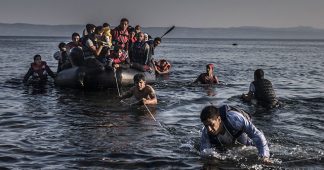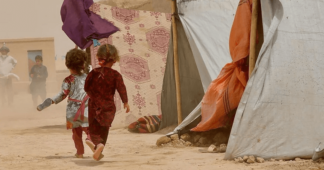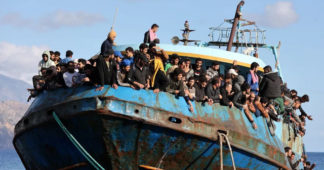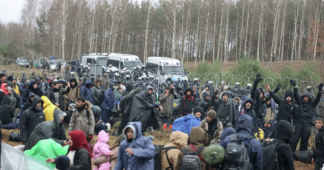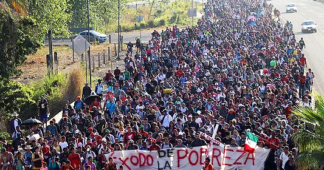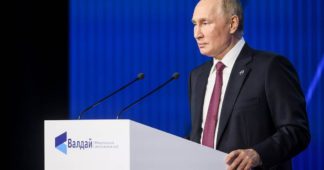By intervening more actively in the current crisis in the Middle East, the BRICS can show that they represent a much broader hope for humanity than the declining West. The situation in Palestine is an enormous, historic political opportunity for the proponents of a multipolar, that is, a more democratic world, Dimitris Konstantakopoulos writes.
By Dimitris Konstantakopoulos
Apri. 5, 2024
For several decades now, the number of people moving from their home country to other destinations has been growing exponentially. The United Nations estimates that more than 280 million people are now living in a country other than their country of birth. This figure is 130 million higher than it was in 1990, and more than three times higher than in 1970, an increase that confirms the escalation of the phenomenon.
Travel by boat across the Mediterranean remains the principal and deadliest route from Asia and Africa to the countries of southern Europe. Thousands of people, including both refugees and economic migrants, have lost their lives trying to cross it in recent years. These travellers, including both women and children, are victims of extensive networks of exploitation, including sexual exploitation. They often find jobs in their host counties where they are treated like slaves and have no rights, and are thus doubly exploited: both by traffickers who force them to pay exorbitant sums by threatening their families with death, and by local employers in the host countries. Others remain in camps for years.
Israel is attempting to expel the Palestinians from Gaza, menacing them with extermination if they do not leave; the ongoing massacre, hunger, thirst, lack of health services, destruction of all infrastructure, terrorism and torture, now threatens to cause a massive new wave of refugees. Egypt’s terrible economic crisis is already fuelling a large migratory flow.
European states are trying to block these flows by various, usually illegal means, but without saying so, and even hiding it.
The arrival of migrants puts pressure on the wages and rights of domestic workers and is often used by capitalists to increase their bargaining power. For instance, in Greece, hotel owners are known to pay their workers meagre wages and subject them to harsh living conditions. Not finding enough Greek personnel to hire, they also turn to outside labour.In European societies, two trends are developing as a result of this phenomenon. The neoliberal view advocates open borders. Implementing this policy would quickly lead to a large portion of Africa and Asia’s population relocating to Europe, triggering a significant swing towards the far-right and a number of other outcomes. It should be noted that immigration is also a curse for the countries of origin of the immigrants themselves, which are losing a significant part of their labour and scientific potential.
The other extreme, the alternative policy, is to drown and kill migrants and refugees on land and sea. We are already doing this to some extent, but this cannot, of course, be considered a solution to the problem. After all, no matter how many people are killed and drowned, there will still be many willing to risk of their lives to come to Europe, whether we like it or not.
The mass migration of tens of millions of people is a significant feature of our era, a result of the dominant global economic and geopolitical model, and a symptom of the deep crisis of a world that is not, in its present structure and composition, sustainable.
Since 2002, the “collective West” led by the United States has carried out a series of disastrous, neo-imperialist, neo-colonial interventions that have destroyed a number of states (Afghanistan, Iraq, Syria, Libya, etc.), resulting in huge flows of refugees and migrants.
Increasingly massive immigration is the result, the symptom of this unacceptable and unsustainable situation. The measures now being taken to curb immigration are ludicrous, as effective as using aspirin to heal a critical ailment. The problem cannot be addressed unless its causes are addressed.The top, most urgent priority now, to begin with, is to put an end to the genocide of Palestinians in Gaza and provide them with substantial assistance to reconstruct their city. Netanyahu must be prevented at all costs from escalating the war in the region.
By intervening more actively in the current crisis in the Middle East, the BRICS can show that they represent a much broader hope for humanity than the declining West. The situation in Palestine is an enormous, historic political opportunity for the proponents of a multipolar, that is, a more democratic world.
More broadly, Western neo-imperialist, neo-colonialist interventions in the Middle East and other parts of the world must be stopped immediately. There must be a generous Marshall Plan for the countries that have fallen victim to them. We urgently need a different economic structure for the planet; to move from a system of supposedly self-regulating markets and the law of the strong to a nationally, regionally and globally planned economy. That would be only kind capable of dealing with the problems of North-South relations and the need to save our world from the threat of a nuclear or climate holocaust.
The most important development of our time is the emergence of the Shanghai Cooperation Organization and the BRICS as a counterweight to the neoliberal monopolistic world dominated by finance capital and the US.
It is a very important step but only the first one. It now needs to be complemented by a second: a proposal for a new global economic, social, democratic and ecological structure, without which the collapse of human civilisation is bound to occur, sooner rather than later.
The emergence of such an alternative vision of the world will also bolster the rise of similar movements in the West, deterring the prevailing now patterns that result in warfare, economic turmoil and ecological degradation.
To some, all this may appear utopian. It may have some utopian aspects, indeed – fewer though than the idea that humanity can persist and survive in its current structure.
